- Home
- Peter Benchley
Peter Benchley's Creature Page 6
Peter Benchley's Creature Read online
Page 6
"It's early for them to be around," Tall Man remarked. "The water must be warming up fast."
When they were half a mile from the island, Chase pointed to a small Institute buoy bobbing off the starboard bow. Tall Man took the boat out of gear, letting it coast up to the buoy, as Chase picked up the boat hook and held it over the side. Chase snagged the buoy and brought it aboard. It was attached to a length of rope.
"Pull," he said to Max.
Max grabbed the rope and began to haul it aboard. "What is it?" he asked.
"An experiment," Chase said, dropping the boat hook and helping Max pull on the rope. "A big problem around here is lost lobster pots. Boat propellers cut the buoys off, or storms carry them away or the ropes just rot and fall apart. Anyway, there are pots lost all over the bottom."
"So?"
"They're killers. All sorts of creatures, not just lobsters—fish, crabs, octopuses—go inside after the baits and can't get out. They die and become bait themselves, so more and more creatures come in and die. The pots keep killing for years and years."
The pot bumped against the side of the boat, and Chase leaned overboard and heaved it up onto the gunwale. It was a rectangular wire cage, reinforced with wooden slats. On one end was a wire funnel—the way in; on the other, a square door made of a flimsy mesh material and secured with twine.
"What Tall and I've been trying to do," Chase said, "is design a biodegradable door. Pots should be pulled at least once a week, preferably twice, so we've been looking for a cheap material for the door that'll degrade after about ten days. The lobsterman can change the door every week, but if the pot's lost, the critters can get free before they die."
Max bent close to the pot and peered inside. "It's empty," he said.
"We didn't put any bait in it," Chase explained. "We're not trying to catch things, we're trying to save 'em." He tugged gently at the mesh in the door, and several strands broke. "This cotton blend may be the thing," he called up to Tall Man. "It's breaking down real well."
When Tall Man didn't reply, Chase looked up at the flying bridge and saw him bend down, his hand cupped over one ear, listening.
Suddenly Tall Man straightened up. "We got trouble, Simon," he said. "A couple of yahoos are yammering over channel sixteen that they've just hooked Jaws."
"Damn!" Chase said. "Can you tell where they are?"
"About three miles to the northeast, sounds like, just this side of Block."
"Let's go," Chase said. He shoved the lobster pot overboard and tossed the rope and buoy after it.
Tall Man put the boat in gear, pushed the throttle forward and, as the boat leaped ahead, turned it in a tight arc and headed toward Block Island.
Max held on to the railing and bent his knees as the bow of the boat thumped into the waves. "Do you think it's our shark?" he shouted to his father.
"I'd bet on it," Chase said. "She's the only one we've seen."
The boat rose up onto a plane and skimmed over the surface. The hump of Block Island grew swiftly larger, and as they watched, a small white dot took shape on the surface of the sea and soon became the hull of a boat.
"What are you gonna do?" Max asked. "What can you do?"
"I'm not sure, Max," Chase said, staring grimly ahead. "But something."
* * *
"They're two kids," Tall Man said, looking through a pair of binoculars. "Sixteen, eighteen, maybe . . . fishin' from a twenty-foot outboard. Stupid bastards. They better hope they don't land the shark; it'll turn that boat into splinters."
Tall Man throttled back as he approached the outboard, then took the boat out of gear and let it idle thirty or forty yards off the outboard's port side.
One boy sat in a fighting chair in the stern, the butt of his rod snugged into a socket between his legs. The rod was bent nearly to the breaking point, and the line led straight out behind the boat: the shark was near the surface, but still fifty yards or more away. The other boy stood forward, at the console, turning the wheel and using the gears to keep the stern of the outboard facing the shark.
"Can he really catch a shark that big?" Max asked. "On a fishing rod?"
"If he knows what he's doing," Chase said. "He's using a tuna rig, probably sixty- or eighty-pound test line with a steel leader."
"But you said the shark weighed a ton."
"He can still wear her out. Great whites aren't great fighters, they're not true game fish. They just pull and pull and finally give up."
As they watched, the boy with the rod tried to reel in some line, but the weight was too great, and the drum of the reel skidded beneath the spool of line. So the boy at the console put the outboard in reverse, backing down toward the shark, giving the angler slack to reel in.
As Chase had feared, the boys knew what they were doing.
"Get closer," he said to Tall Man. "I want to have a talk with them."
Tall Man maneuvered so that the stern of the boat was within ten yards of the side of the outboard. Chase walked aft and stood at the transom.
"What've you got there?" he asked.
"Jaws, man," the boy at the console said. "Biggest damn white shark you ever seen."
"What're you gonna do with it?"
"Catch it ... sell the jaws."
"How're you gonna get it aboard that little boat?"
"Don't have to ... gonna kill it, then tow it in."
"Kill it how? That's one big angry shark."
"With this." The boy reached under the console and brought out a shotgun. "All we have to do is get close enough to him for one clean shot."
Chase paused, considering, then said, "Did you know he's a she?"
"Huh?"
"That shark is a female, and she's pregnant. We've tagged her, we've been studying her. If you kill her, you're not just killing her, you're killing her and her children and her children's children."
"It's a fish," the boy said. "Why should I give a shit?"
"Because white sharks are very rare... endangered, even. I'll make you a deal. You cut that shark away—"
"Fuck you!" shouted the boy with the rod. "I been busting my hump—"
"—and I'll get your names in the paper for helping the Institute. You'll get a lot more mileage than if you just kill her."
"Not a chance." The boy with the rod yelled over his shoulder, "Come back some more, Jimmy. He's takin' line again."
The boy at the console put the outboard in reverse, and Chase saw the angle of the line increase as the boat neared the shark.
"Dad," Max said, "we've gotta do something."
"Yeah," Chase said, leaning on the bulwark as he felt rage rise within him. The problem was, there was nothing he could do, not legally anyway, for the boys were breaking.no law. And yet he knew that if he let this happen, he would never forgive himself. He turned away and went below.
When he returned, he was carrying a mask and a pair of flippers, and a pair of wire cutters was stuck in the belt of his shorts.
"Jesus, Simon . . ." Tall Man said from the flying bridge.
"Where is she, Tall?"
Tall Man pointed. "About twenty yards thataway, but you don't—"
"She's so worn out and confused, she won't pay any attention to me. Last thing she wants to do is eat anybody."
"You know that, do you?"
"Sure," Chase said, forcing a smile and pulling on his flippers. "At least, I hope that."
"Dad!" Max said, as Chase's intent suddenly dawned on him. "You can't-—"
"Trust me, Max." Chase pulled the mask over his face and rolled backward off the bulwark.
The driver of the outboard saw the splash as Chase fell into the water, and he shouted, "Hey! What the hell's he up to?"
"What you shoulda done way back when," Tall Man said.
The boy picked up his shotgun and cocked it. "You get him back, or—"
"Put that away, you little prick," said Tall Man, in a voice as flat and hard as slate, "or I'll come over there and make you eat it."
; The boy looked up at the huge dark man towering over him on the flying bridge of the much larger boat, and he lowered the shotgun.
Chase located the line feeding down from the outboard and followed it with his eyes until he saw the shark. He took three or four deep breaths on the surface, held the final one and thrust himself downward with his flippers.
The shark had stopped fighting, for in its initial thrashing it had rolled up into the steel leader and then into the line itself, and now it was circled with monofilament strands that pressed into its flesh. It lolled on its side; perhaps resting for a final, futile attempt to escape, perhaps already resigned to death.
Chase swam to it, staying away from the snarls of line until he was within arm's reach of the tail of the shark.
He had never before swum in the open with a great white shark. He had seen them from the safety of a cage, had touched their tails as they swept by the bars in pursuit of hanging baits, had marveled at their power, but he had never been alone in the sea with this ultimate predator.
He permitted himself a moment to run his hand down the steel-smooth skin of the back, then backward against the grain of the dermal denticles, which felt like rubbing sandpaper. He found his tagging dart and its tiny transmitter, still securely set in the skin behind the dorsal fin. Then he leaned over the shark; its eye gazed at him with neither fear nor hostility, but with a blank and fathomless neutrality.
There were six loops around the shark—one of steel, five of monofilament—starting just forward of the tail, ending just forward of the pectoral fins. Chase hovered above the shark, nearly lying upon its back, took the wire cutters from his belt and cut the loops one by one. As each muscle group in the torpedo-like body sensed freedom, it began to shudder and ripple. When the last loop was gone, the shark swung downward, suspended only by the wire in its mouth that led to the hook deep in its belly. Chase reached his hand into the mouth of the shark and snipped the wire.
The shark was free. It began to fall, upside down, and for a moment Chase feared that it had died, that the lack of forward motion had deprived it of oxygen and it had asphyxiated. But then the tail swept once from side to side, the shark rolled over and its mouth opened as water rushed over its gills. It turned in a circle, its eye fixed on Chase, and rose toward him.
It came slowly, relentlessly, unexcited, unafraid, its mouth half open, its tail thrusting it forward.
Chase did not turn or flee or backpedal. He faced the shark and watched its eyes, knowing that the only warning he would have of an imminent attack would be the rotating of its eyeballs, an instinctive protection against the teeth or claws of its victim.
He heard his temples pounding and felt arrows of adrenaline shooting through his limbs.
The shark came on, face-to-face, until it was four feet from Chase, then suddenly rolled onto its side, presenting its snow-white belly distended with young, and angled downward, like a banking fighter plane, disappearing into the blue-green depths.
Chase watched until the shark was gone. Then he surfaced, snatched a few gasping breaths and made his way back to the boat. He pulled himself out of the water, and as he sat on the swimstep to remove his flippers, he noticed that the pulpit of the Institute boat was hovering over the hull of the outboard. He heard Tall Man say, "So, we got a deal, right? The story is, you hooked the shark, saw that it was tagged and reported it to us. We tell the papers what fine citizens you are."
The sullen boys stood in the stern of the outboard, and one of them said, "Yeah, okay. . . ."
Tall Man looked down, saw that Chase was aboard, then put the boat in reverse. "Thanks," he called to the boys.
Chase passed Max his flippers and climbed up through the door in the transom.
Max looked angry. "That was really dumb, Dad," he said. "You could've—"
"It was a calculated risk, Max," Chase said. "That's what dealing with wild animals is. I was pretty sure she wouldn't bite me; I made a judgment that the risk was worth taking, to save the life of that mama shark."
"But suppose you'd been wrong. Is a shark's life worth as much as yours?"
"That's not the point; the point is, I knew what I had to do. The Bible may say man has dominion over animals, but that doesn't mean we've got the right to wipe them off the face of the earth."
* * *
Max was standing at the end of the pulpit, Chase behind him on the foredeck, as they passed through a stretch of deep water between the islands.
Suddenly Max shouted, "Dad!" and pointed down into the water.
A dolphin had appeared from nowhere and was riding the bow wave of the boat, coasting effortlessly on the bulb of water created by the boat's forward motion. They could see its shiny gray back, its pointed snout, the puckered blowhole in the top of its head. They could hear sounds—faint clicks and trills—coming from somewhere within the animal.
"He's talking!" Max said excitedly. "That's how they talk! I wonder what he's saying,"
"Probably just jabbering . . . maybe calling his buddies over, maybe saying something like 'Whee!'"
For several moments, the dolphin's body barely moved; it let the momentum of the boat carry it along. Then, for some reason, it accelerated, thrusting its horizontal tail up and down, and pulled ahead of the boat. It slowed, waited for the boat to catch up and resumed its ride.
"Look at that tail," Chase said.
Max leaned over the pulpit. "What about it?"
"The left fluke. Look at the scars."
Max looked, and saw five deep white slashes, an inch or two apart, in the flesh of the tail fluke. "What did that?" he asked.
"This dolphin was attacked by something," Chase said. "I'd say he was lucky to get away."
"A shark?"
"No, not a shark, no shark did that. A shark bite would be semicircular."
"A killer whale?"
"No, you'd see punctures or drag marks from the conical teeth, not sharp slashes like those." Chase frowned. "They look like claw marks, like a tiger's or a bear's."
"What lives in the ocean and has five claws?"
"Nothing," Chase said. "Nothing I've ever heard of."
11
THE dock had been built in a cove on the northwest corner of the island, and as the boat puttered up to it, Chase nudged Max and pointed overhead and smiled: a pair of ospreys were flying high over the water, searching for food for their young, which were sheltered safely on nesting poles that Chase had built.
"Once ospreys were almost wiped out," he told Max. "For some reason, their eggs had become so weak they were cracking before the chicks could hatch. A scientist got to wondering what was doing it, and he found out: DDT. The pesticide was leaching into the water and poisoning the food chain, and the fish the ospreys were eating were destroying their eggs. That discovery was the beginning of the Environmental Defense Fund. Once they got DDT banned, the ospreys started coming back. They're in pretty good shape now."
A one-winged blue heron stood sentinel over his tidal pool by the dock.
"Hey, Chief," Tall Man called to the bird, then he looked at Chase and said, "The Chief is pissed. His lunch is late."
"That's Chief Joseph;" Chase explained to Max. "Some kids found him over at the borough beach. He had a broken wing; the vet they took him to said the wing was too badly smashed to fix, he wanted to put him to sleep, but I said no, just amputate the wing and let us have him. He's become a real prima donna. Twice a day he walks around in the shallows, the rest of the time he stands there and complains that we don't feed him enough."
"Why'd you name him Chief Joseph?" Max asked.
"Tall named him that, after the Nez Perce chief . . . you know, the Battle of Bear Paw Mountains. He said that with only one wing the heron reminded him of what Chief Joseph said after the battle: 'I will fight no more forever.'"
"Is the Chief friendly?"
"If you've got food he is. If you don't, he's a perfect pain in the ass."
Max grinned. "Maybe I'll find some special animal, somet
hing I can take care of and name."
"Sure," Chase said. "Maybe you will."
Tall Man guided the boat into its slip between two smaller craft-—a Whaler and a Mako—and Chase hopped onto the dock and retrieved the lines. He tossed the stern and spring lines to Tall Man and returned aboard to show Max how to cleat the bow line.
Then, while Tall Man went to find food for the heron, Chase and Max went on up the hill.
Osprey Island had been a private family compound for nearly a hundred years, but over four generations the family had outgrown the five houses that local zoning permitted. Periodically, family members had tried to buy one another out, but they had found themselves caught in a paradox.
Technically, because it consisted of thirty-five acres of waterfront property, the island was worth a fortune, and the state and township had taxed it accordingly. Over the past two decades, taxes had doubled, and doubled again, until finally the cost of running the enclave had approached a hundred and fifty thousand dollars a year. One by one, family members had discovered that for their allotted two weeks on the island every summer, they were paying more than the cost of renting a decent house on Nantucket or Martha's Vineyard for two months.
They had tried to sell the island, and discovered that, in fact, it wasn't worth very much at all because nobody—including the family members themselves— wanted to pay its assessed value.
And so, in a calculated act of revenge against the local "taxocrats," the family corporation, an entity that existed solely to run the island, had taken out as large a mortgage as the local bank would permit—half the assessed value—had split the proceeds among the twelve families within the family . . . and had then dissolved itself and abandoned the island, leaving its liens, its taxes and its upkeep in the hands of the bank.

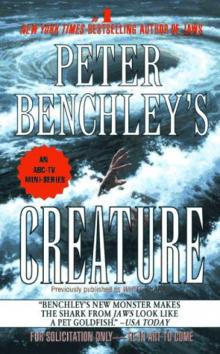 Peter Benchley's Creature
Peter Benchley's Creature The Island
The Island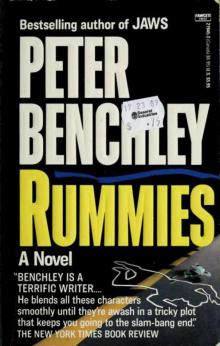 Rummies
Rummies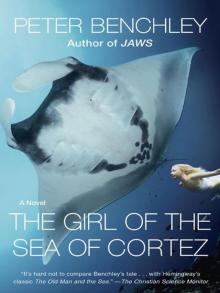 The Girl of the Sea of Cortez: A Novel
The Girl of the Sea of Cortez: A Novel Time and a Ticket
Time and a Ticket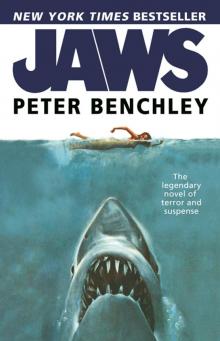 Jaws
Jaws The Deep
The Deep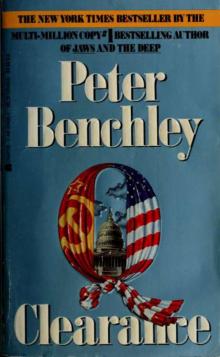 Q Clearance
Q Clearance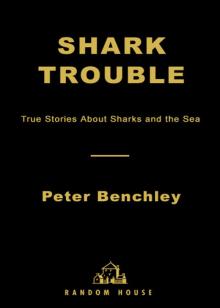 Shark Trouble: True Stories and Lessons About the Sea
Shark Trouble: True Stories and Lessons About the Sea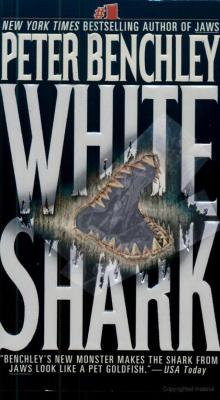 White Shark
White Shark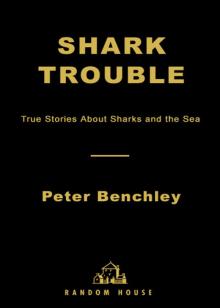 Shark Trouble
Shark Trouble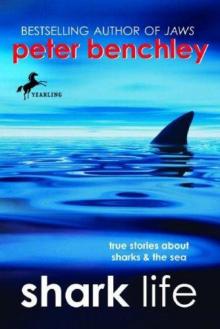 Shark Life: True Stories About Sharks & the Sea
Shark Life: True Stories About Sharks & the Sea